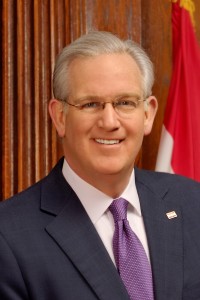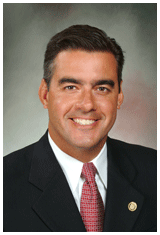JEFFERSON CITY, Mo. — Dozens of bills remained on calendars as lawmakers moved into the final week of the first regular session of the 97th General Assembly.
As the week began, it was more clear what may be dead than what may make it to the finish line and on to the governor’s desk.

A bonding proposal sponsored by House Speaker Tim Jones, R-Eureka, seemed likely dead. A proposal to expand the state’s Medicaid rolls to 300,000 Missourians pushed by Gov. Jay Nixon hardly received any attention by the legislature. And a proposal to expand the ability of investor-owned utilities to seek an infrastructure system replacement surcharge from the Public Service Commission supported by Senate leadership did not seem to have much of a chance of moving out of the General Assembly.
But what will move? Senate President Pro Tem Tom Dempsey, R-St. Charles, said he thinks there is a shot for Sen. Scott Rupp’s changes to the insolvent Second Injury Fund for worker’s compensation to move forward, a sentiment carried by Jones.
“It is a huge crisis: If we could get that resolved, that would make the session a giant victory,” he said.
The two leaders also believe they can move on economic development issues as well as tax credits.

“We’re not as close as I like but we are getting closer,” Dempsey said, noting that “both sides” would need to move if they plan to get anywhere on the tax credit. “My hope is that we can get that one across the finish line.”
The tax credit issue is one of many in General Assembly this year that has attracted the attention of dozens of lobbyists. While some lawmakers are calling for real reforms and cutbacks in the tax code, an army of lobbyists has lined up on the front lines of the battle to protect their various interests.
HB 698, carried by state Rep. Anne Zerr, R-St. Charles, is currently in conference committee. The legislation would extend the land assemblage tax credit, while at the same time creating a data storage centers tax credit, the angel investment incentives, export incentives, and new credits for career centers. At the same time, the bill would end tax credits distributed under the Neighborhood Assistance Act, and place caps on several other tax credits, most notably one for low income housing.
Jones said Dempsey has been an “honest broker” on the issue. Throughout the session, the two have developed a deep working relationship. The two meet regularly, in private, to discuss their various priorities. Jones said, “I think he is at the point where he will be willing to work with us on anything,” but said Dempsey was concerned about a filibuster on the issue that would eat up vital time in the final week of session.

His problem is he doesn’t know who is going to pop up on that issue at any given time,” Jones said. “Any proposal that is reasonable could pass. The problem is if you get the filibuster in the last week.”
Dempsey said he believed a bill that would alter prevailing wage rules for educational projects could move in the final week. He said he had been discussing the issue with Sen. Brian McKenna, D-Crystal City, in order to win over some support, or at least minimal opposition, from Democrats.
Dempsey said he is proud of Senate Majority Leader Ron Richard, R-Joplin, for keeping debate going late to move forward on some major bills and getting them to the governor’s desk before the final week.
“I don’t like waiting till the last minute,” he said.
A resolution that would call on voters to approve a one-cent sales tax for transportation sponsored by Sen. Mike Kehoe, R-Jefferson City, appears dead in the House. Dempsey told reporters on Thursday that Jones has told him that he has to achieve a target number of support from his caucus in order to move forward on the bill, despite the fact that he keeps “hearing the votes are there to pass it.”
Jones said he placed it on the calendar last week, so it would be at Majority Floor Leader John Diehl’s discretion as to whether or not to bring it up in the last week, and how it shapes up in conference committee. Jones, who once called the proposal an “$8 billion tax increase” that would “not sail in my caucus,” said his members may be more comfortable with the proposal in its current form and particularly because they just passed an income tax cut.
“Republicans have always said ‘fair tax’ is what is in our philosophical playbook,” he said. “Everyone has to pay that. Whether it is people who are trying to avoid paying income taxes or illegal immigrants, everyone has to pay that form of tax.”
The so-called liquor wars proposal could also get a shot in the Senate. The bill would modify “the definition of franchise under Missouri franchise law, specifically for agreements between alcohol wholesalers and suppliers so that a franchise may exist even without a license to use a trade name, trademark, or service mark and regardless if there is a community of interest in the marketing of the products.” An army of lobbyists has been hired both for and against the bill, which passed the House last week as an amendment.
“On the liquor franchise, with 100-some votes in the House, I’m pretty much obliged to bring it up during the week, but we’ll see what happens,” Richard said.
Much like the Senate, the House has moved forward on many of its priorities — leaving more time in the final week to move through some 120 bills remaining on its calendar. Jones said he was proud of the session, adding, “I’m going to call this one of the most successful sessions since Catherine Hanaway took the helm, when they had major reforms that year.”
Jones touts the body’s move on an income tax cut, passing labor bills, tax credits, and pro-gun legislation as a “huge success.”
Regardless of what the body passes in the final week, Nixon, of course, gets to leave his mark on the bills. Nixon has never been a fan of the labor bills proposed by Republicans, but a gun enthusiast, himself, has not weighed in on some of the Second Amendment bills pushed by Republicans. Nixon has called for tax credit reform, but in a comprehensive way, not piecemeal — leaving him some amount of wiggle room on some of the credit issues expected to hit his desk.
Whatever Nixon vetoes, Jones will have to pull 109 votes to override him. With Rep. Jason Smith’s likely move to U.S. Congress in June, this would require all of Jones’s Republican members to be present. No vacations, no family emergencies, no illnesses, nothing. Each absence could force Jones to pull support from a Democrat, which on some of the gun, labor, or tax cut issues would seem unlikely.
To contact Eli Yokley, email eli@themissouritimes.com, or via Twitter at @eyokley.



